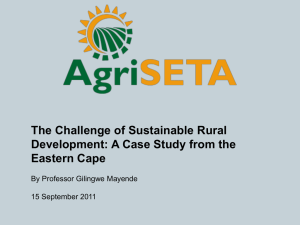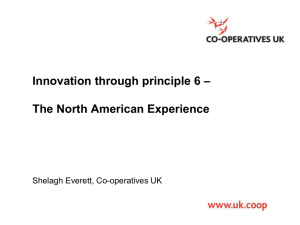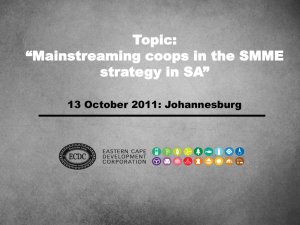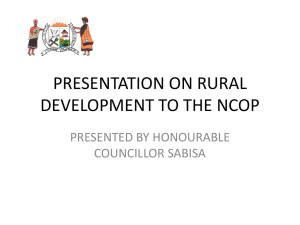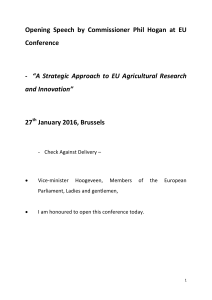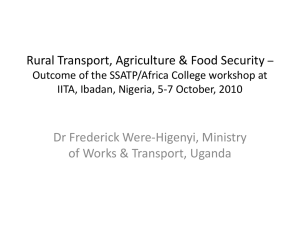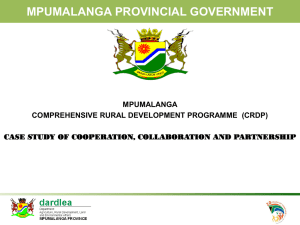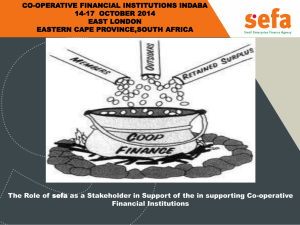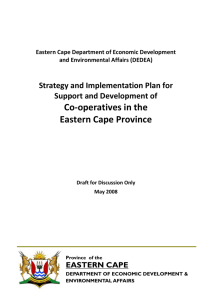Empowering Co-operatives through skills development
advertisement
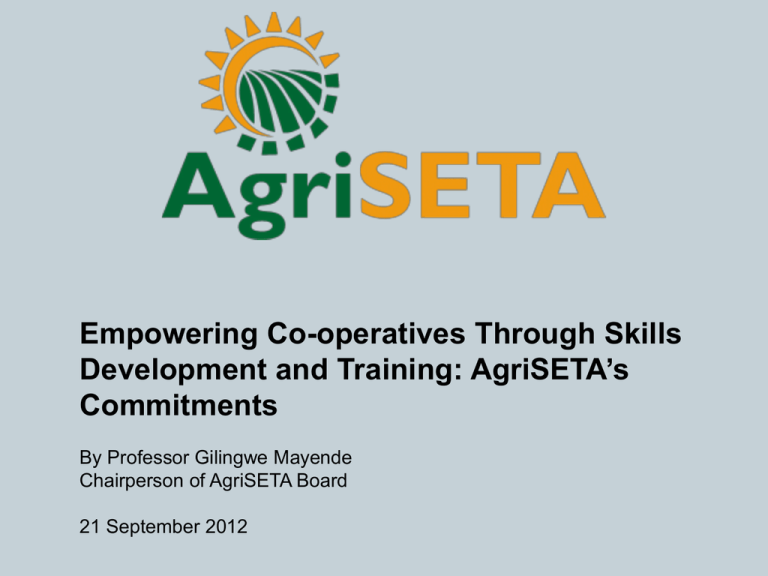
Empowering Co-operatives Through Skills Development and Training: AgriSETA’s Commitments By Professor Gilingwe Mayende Chairperson of AgriSETA Board 21 September 2012 Contents • • • • • • A brief sketch of the CRDP Some key imperatives in rural development Some major emerging challenges of the CRDP The new co-operative thrust in SA Agricultural Co-operatives Challenges facing agricultural co-operatives in SA • Some key determinants of sustainability • AgriSETA’s Commitments A brief sketch of the CRDP (2009) • CRDP’s major objective is the establishment of ‘vibrant and sustainable rural communities’ characterised by access to productive assets, and employment opportunities • Almost exclusive focus on the former homelands • Agrarian transformation as a central platform for rural development and as a springboard towards other productive processes, including spin-offs in rural manufacturing, particularly agro-processing, as well as a range of non-agricultural activities A brief sketch of the CRDP (2009) • Strategic investment in infrastructure for the benefit of entire rural communities and not only those involved in agricultural production • Social mobilisation through the establishment of social clubs and co-operatives for economic activities, wealth creation and productive use of assets • Linking of agrarian transformation to land reform for the purpose of accelerating access to land in relevant cases, strengthening tenure security and speedy processing of outstanding restitution claims Some Key Imperatives in Rural Development • Creation of opportunities for employment and suitable conditions for raising an adequate income – a fundamental requirement for human dignity and decent work. • Promotion of the of the income-generating capacity of households • Fostering conditions for beneficiaries to produce a surplus and make a profit • Support mechanisms for communities to become real owners of their enterprises development projects • Integration of the beneficiaries into the wider national economy as producers of goods and services, and as contributors to the national fiscus as taxpayers Some Major Emerging Challenges for the CRDP • Methodologically, the research approach of the programme based on ‘pilot studies’ has a number of flaws, e.g. • ‘Lessons’ derived from the Giyani pilot are not necessarily replicable elsewhere; e.g. provision of 231 houses will not easily be replicated in the 161 wards in the area let alone the thousands of rural villages throughout the country Work done within a pilot study area takes place under ideal conditions, which gives the information gathering exercise a highly subjective character The piloting exercise is also a concentrated effort, characterised by the disproportionate deployment of resources to the pilots Some Key Emerging Challenges for the CRDP • Allocation of appropriate budgets • No clear empowerment model for communities through promotion of ‘development from below’ • ‘Welfarist’ or subsistence, grant-based rather than subsidy model • The model seems to falling into the trap of the pitfalls of the group-based approach • Assumption of a balanced equation in terms of the configuration of roles of power structures at the local level • Tension between traditional authorities and elected councils, whilst communities are organisationally weak and therefore marginalised Some Major emerging Challenges for the CRDP • With regard to non-agricultural interventions, weak linkages with the SMME development work being done by the DTI and SEDA, and the Department of Public Works’ EPWP • Lack of an enterprise development model • Vagueness on how agro-cessing would be introduced, and how funding for it would be mobilised, including private sector investment • The section on co-operatives in the CRDP framework document is very weak and lacks a clear vision The New Co-operative Thrust in SA •A wide range of government departments such as the DTI, Department of Higher Education, Labour, Agriculture Forestry and Fisheries, Social Development, Defence and Military Veterans are actively working towards establishment of cooperatives • A number of institutions such as SEDA, NEDLAC, COSATU and many others are also playing a pivotal role • National Treasury is working on the establishment of a Cooperative Bank • Existing legislation and policies are being revised to provide inter alia for the establishment of a Co-operatives Development Agency and an apex body that will represent all co-operatives in the country Agricultural Co-operatives Success stories in Africa and Asia show that co-operatives: • Enable their members to become active and meaningful participants in local and national economies, and they promote socio-economic development • Help create employment and the development of human resources as they provide training opportunities for nonskilled and skilled members • Provide an organisational framework to deliver cheaply interventions aimed at assisting members to access services such as extension and input supply and facilitate access to financial services • Smooth income flow to members through bulk marketing and collective negotiation, collective investment in machinery, as well as promote economies of scale Agricultural Co-operatives • Facilitate expansion of productive activity and diversification to agro-processing and other forms of value addition, and enable the producers to sell in processed form commodities previously sold in raw form very near to the farm gate, which in turn promotes entrepreneurship • Ease pressure and over-dependency on the government with regard to provision of housing, healthcare, electrification • Enhance family and social values, and promote peace and security within communities by lessening social tensions and discouraging deviant behaviour • Promote social cohesion and peer monitoring Challenges facing Agricultural Cooperatives in SA • High failure rate among co-operatives • How to ensure effective participation by communities and avoid the dominance that is often exercised by prominent individuals and institutions • How to get local government to interface effectively with the institutions supporting co-operatives • Strengthening stakeholder mobilization and buy-in Challenges facing Agricultural Cooperatives in SA • • • • Low skills and knowledge base base How to empower the youth through co-operatives Low asset and resource base among communities Unsustainable funding model – grant rather than subsidy-based • Handout mentality and ‘culture of entitlement’ • Exclusion of co-operatives in locally-based planning initiatives Challenges facing Agricultural Cooperatives in SA • Top-down communication and implementation approach • One size fits all approach • General lack of organization among communities visà-vis formal government structures, particularly at the provincial and municipal levels • No clear articulation of enterprise development and community ownership of enterprises in development plans Challenges facing Agricultural Cooperatives in SA • Risk aversion/avoidance among rural/communities • Weak linkages with extension services to support productive activities of co-operatives • Ineffective training methods • Weak research base and backing Some Key Determinants of Sustainability • Movement away from the project approach (ISRDP approach) towards a more integrated programme approach covering larger target groups and areas • Investment in infrastructure directly productive infrastructure such as irrigation systems, while roads must connect the production areas with markets • Effective organisation of the production process with issues such as natural resources, capital assets, inputs and market access being integral parts of strategy • Training should move away from the classroom-based type towards more interactive approaches such as Paolo Freire’s Dialogical Approach • Factoring in of indigenous knowledge systems Some key Determinants of Sustainability • Inculcation of a culture and mindset of entrepreneurship and ‘own contribution’ • A strong co-operative movement would ensure a strong movement towards rural development • This would also support the democratization of the South African economy right down to the village level • Facilitation rather than prescription • Ensure strong research basis for policy/programme interventions AgriSETA’s Commitment to Rural Development & Co-operatives • Coperatives in NDSII • Provision of systematic and in-depth training • R21 million allocated for 2013/14 budget • R10 million allocated by DRDLR • R4 million allocated by DAFF • Delivery mechanisms – AFETs and accredited service providers • Parternships with all relevant stakeholders (DAFF, DRDLR, SEDA, DBSA, SANACO, NYDA, etc) Thank You

